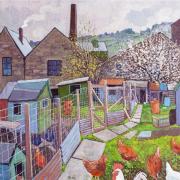As part of our 'My Life' series of features written by readers, we invited Kathleen Calvert to talk about life on a Lancashire farm
Young Farmers’ Club Elizabeth’s snap up prize
Lancashire’s Elizabeth Coar has won first prize in the National Federation of Young Farmers’ Clubs photography competition. Her picture of sheep shearing won the competition sponsored by the British Wool Marketing Board, as part of British Wool Week.
The picture, below, titled ‘Carefully Shorn, Lovingly Worn’, showed Steven Walker, a member of Slaidburn YFC, shearing sheep at the Hodder Valley Show.
Elizabeth, 22, secretary of the Samlesbury YFC, won the top prize of �500 towards the cost of travelling with four other members from her club to London to attend the Wool Exhibition, a major part of this year’s Campaign for Wool promotions.
Woolly Winter – Winter Wonderland at Garrowby Estate, York, took second place for Gemma Woodall, 24, of Beacon YFC and Hanna Land, 15 from Withleigh YFC, Devon took third place.All three winning photos will be reproduced as part of promotional material for the Wool Week event by the British Wool Marketing Board. The theme of the competition was ‘Origin is Everything - The Journey of Wool’, aimed to raise public awareness of the British product.
Elizabeth also helped to celebrate the 75th birthday of Samlesbury YFC. She is pictured cutting a special cake with chairwoman Jayne Rowlandson at a charity fundraising night.
We hear a lot about the importance of the rural economy but it’s only when you talk to farming families you realise just how dependent we are on their success to provide jobs and put food on our tables.
Kathleen Calvert and her husband Derrick run Manor House Farm at Paythorne near Gisburn. They and their neighbours were ravaged by Foot and Mouth in 2001 but they rebuilt and now run a thriving if tough business. Kathleen writes about life on the farm:
Farming families have deep affinity to animals, the countryside and a unique way of life full of unpredictable challenges.
Ours is very much a family farm, with husband Derrick and myself both from dairy farming families. Sara, the eldest of our two daughters, works part time on the farm, looking after our calves, while her boyfriend William is full-time assistant herdsman.
We now have a herd of 180 Pedigree Holstein cows, each producing on average around 9,000 litres of milk a year, breeding and raising our animals from birth on the farm.
Life on the farm can be varied and it’s often hectic, starting at 6.30am. We milk twice daily, morning and evening, seven days a week. This is the priority unless there are emergencies. The other morning Derrick found a newly calved cow in a bad way. She needed calcium through a drip, otherwise she would have died. Once treated, she recovered.
While cows are milked, living quarters are cleaned and baby calves fed. Fresh feed is mixed and fed to the cows before our own breakfast. Other routine jobs take until lunchtime including feeding older calves, cleaning, putting straw down, checking outlying animals and assisting with the artificial insemination. The vet and foot trimmer are routine callers.
Afternoon jobs depend very much on the time of year and the weather, including things like fencing or maintenance work.
The tanker collects milk daily, animal feed and other supplies are delivered regularly, and then there is land management, silage, other seasonal work and meetings with specialists such as our nutritionist. It is soon milking time again which usually takes us to around 8pm.
On top of all that is the extensive paperwork and record keeping we must deal with, and I also work part time in the local Job Centre.
I value the moment, enjoying reading, writing, and the garden. It’s full of colourful perennials and wildlife, and the view is amazing.
We don’t get away often but we enjoy working in the countryside with animals, spending time with friends, and meeting different people. We have had visitors from Sweden, Canada and Nepal recently.
My local W.I. in Gisburn featured in Lancashire Life to help promote the serious decline of honeybees. We got a letter from the Queen after that!We trust our local contractors and suppliers to give us the good service we rely upon because, whatever happens, our animals have to be milked, fed and cared for 24 hours a day, 365 days a year in all weathers.
They are often long-term relationships such as with local feed suppliers Dugdale Nutrition. They have had the custom of three generations of Calverts. Like our own farm, this is a family run business.
I realised while preparing to meet our MP that we alone have over 60 suppliers. They have their own suppliers and employees; all those use local shops, pubs, garages, tradesmen etc.
With such a consistent high turnover of business, the success or loss of dairy farms impacts on many factors, and has kept money circulating within local economies for centuries.
Dairy farming is a very satisfying way of life when things are going right and we produce one of the most nutritionally complete foods.
But production costs have risen steeply and British farmers, who also have to meet mandatory standards not required of imported dairy produce, now receive the lowest average farm gate milk price in the EU - only 26.29p a litre, while it is retailed over 135 per cent higher at around 62p.
Consumers can help UK dairy farmers by choosing dairy products like cheese and yoghurt produced from British milk, and by insisting on clear ‘Country of Origin’ labelling.
160 year tradition
Derrick Calvert is the third generation of his family using local feed supplier Dugdale Nutrition of Clitheroe where managing director, Matthew Dugdale (below) is the sixth generation to lead the family owned company in its 160 year history.
The company specialises in feeds for ruminant animals, its core market being dairy farming. This means its 49 employees and their families rely heavily in turn on local dairy farms for their livelihood.
Even before taking Dugdales’ own suppliers, sub-contractors and hauliers into account – Matthew estimates at peak times up to 30 more people derive a large proportion of their income from Dugdale Nutrition.


























